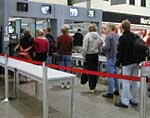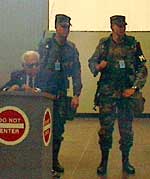By Kaomi Goetz
Minnesota Public Radio
November 12, 2001
The crash of an American Airlines Airbus departing from New York's JFK Airport has stoked new fears for the safety of air travel. On the ground, the nation's airports are still struggling to improve the quality of the private companies that operate passenger security checkpoints. Some of those firms have been sharply criticized for myriad shortcomings, including failing to detect concealed weapons and hiring checkers with criminal records. Globe Aviation Services handles security screening at Minneapolis-St. Paul International Airport. The company says it's taken several steps to tighten procedures since the September 11 attacks.
| |
|
|
|
||
A lot has changed for airport security screeners since the September 11 terror attacks.
"People are taking it more seriously. If they're not they can get suspended," says Cassandra Zelesnikar, a screener at the airport. Zelesnikar, who has been in the job since August, says the process has gotten better.
"It's more serious now. You don't see people just sitting around anymore - they're actually working pretty hard," she says.
One sign of change is sharply-improved pay and benefits for screeners like Zelesnikar. Globe Aviation Services President Ron Harper says starting pay is $12 per hour, up from $8 per hour before. Workers also get full health benefits after 90 days, and a free flight after a month of service.
Harper says workers are being retrained to meet new regulations imposed by the Federal Aviation Administration after the terror attacks.
"You've done something for a certain time, and knew what was allowed and what wasn't allowed, and now you have to rethink the way you do that," Harper says.
New FAA safeguards include additional checkpoints, limited gate access to passengers, and random searches of checked baggage.
Globe is a unit of Securitas, a Stockholm-based conglomerate. The company has been at the Minneapolis-St. Paul airport since 1996. Globe also handles airport security at La Guardia in New York, Reagan National in Washington D.C., and the American Airlines terminal at Logan Airport in Boston.
Congress is debating major changes to the nation's aviation security system. The chief item of debate is whether airport screeners ought to become federal employees. Under the existing system, airlines hire the security firms covering their flights. That means Northwest Airlines, as the dominant carrier in the Twin Cities, hires Globe.
Critics say the low pay offered by security companies didn't attract the best applicants, and contributed to excessively high turnover rates. Globe's Ron Harper says his company is meeting the challenge.
| |
|
|
|
||
"We are doing everything we can as this threat has changed. It's important to remember that prior to Sept 11, some of the items were allowed on airlines - those flights were taken over with items that were "legal," under FAA guidelines that were in place at the time," says Harper.
A Northwest spokeswoman says the airline chose Globe because it met necessary guidelines, including cost and the ability to do the job.
It's the concern for the bottom line that worries Kathy Sweet, an airline security expert. She says airlines often cut corners where they can.
"Globe is no better than others and no worse. They provide security on a contractual basis, and it usually goes to the lowest bidder," says Sweet.
Sweet says she's still not convinced airport security nationwide is adequate. Part of the problem, she says, is the airlines' concern for their on-time status. But Globe's Ron Harper says that's no longer true.
"I think the airlines still would like to have the on-time record as good as possible. But I think the whole industry is focused now on security, and if planes are delayed because of security issues, I can guarantee you the airlines are not going to be worried on that," Harper says.
Globe is planning to double its personnel at the Minneapolis-St. Paul airport to about 300 employees, with about 100 more to hire.
While Congress debates who should take over responsibility at the checkpoints, Jim Welna, director of Public Safety for the Metropolitan Airport Commission, says that argument is missing the issue.
"Who carries out the work, whether it's a federal employee or a private company isn't so much the issue, it's a matter that we execute it properly," Welna says. "On September 11, it wasn't so much what they carried with them on the plane, it was what they carried with them in their minds - a commitment to kill other people and themselves. That's really an element that needs to be continually looked at, that there's more risk than just what they carry with them."
Congress is expected to vote on a compromise airport security measure sometime before the Thanksgiving holiday.
More from MPR


